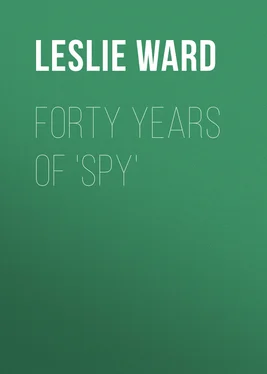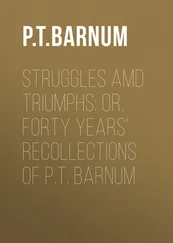Leslie Ward - Forty Years of 'Spy'
Здесь есть возможность читать онлайн «Leslie Ward - Forty Years of 'Spy'» — ознакомительный отрывок электронной книги совершенно бесплатно, а после прочтения отрывка купить полную версию. В некоторых случаях можно слушать аудио, скачать через торрент в формате fb2 и присутствует краткое содержание. Издательство: Иностранный паблик, Жанр: foreign_prose, foreign_home, visual_arts, на английском языке. Описание произведения, (предисловие) а так же отзывы посетителей доступны на портале библиотеки ЛибКат.
- Название:Forty Years of 'Spy'
- Автор:
- Издательство:Иностранный паблик
- Жанр:
- Год:неизвестен
- ISBN:нет данных
- Рейтинг книги:4 / 5. Голосов: 1
-
Избранное:Добавить в избранное
- Отзывы:
-
Ваша оценка:
- 80
- 1
- 2
- 3
- 4
- 5
Forty Years of 'Spy': краткое содержание, описание и аннотация
Предлагаем к чтению аннотацию, описание, краткое содержание или предисловие (зависит от того, что написал сам автор книги «Forty Years of 'Spy'»). Если вы не нашли необходимую информацию о книге — напишите в комментариях, мы постараемся отыскать её.
Forty Years of 'Spy' — читать онлайн ознакомительный отрывок
Ниже представлен текст книги, разбитый по страницам. Система сохранения места последней прочитанной страницы, позволяет с удобством читать онлайн бесплатно книгу «Forty Years of 'Spy'», без необходимости каждый раз заново искать на чём Вы остановились. Поставьте закладку, и сможете в любой момент перейти на страницу, на которой закончили чтение.
Интервал:
Закладка:
A well-known composer, whose name is probably merged in memories of the near past, is Sam Lover, who will be remembered as the writer of "Molly Bawn," "Rory O'More," "The Four-leaved Shamrock," and many others. His career was a strange and varied one. Beginning life as an artist, he won his way to fame in Dublin, where he became a very popular miniature painter, and many famous men of the day sat to him. His roving taste, however, led him gradually to abandon art for literature. In this again he was successful, and came to London, where he contributed to most of the magazines of the day, and wrote several novels. After more successes he began to compose the songs so well known to-day. About the same time he wrote ballad poetry, but finding the output a strain, he prepared a series of entertainments which he entitled "Irish Evenings," in which he embodied songs and music of his own composition. These entertainments became exceedingly popular, and the reputation he acquired led him to extend his horizon to America. On returning, he turned his experiences to account, and finally changed his profession and sailed away to become an English foreign consul in foreign lands. Before he left England he said to my mother, "Mrs. Ward, if I return, I know I shall find you as young as when I leave you!" He has not returned, but his words come back to me, for indeed she seems to have discovered the secret of eternal youth.
Felix Moscheles the painter, was a constant visitor at our house, and he was the son of old Mr. Moscheles the great composer and pianist and friend of Mendelssohn. Felix Moscheles was a chum of Du Maurier when both lived in Paris, and he wrote a biography of this eminent Punch artist and author of "Trilby." Inheriting some of the remarkable gift of his father (quite apart from his talent as a painter) Felix played the piano, but he was astonishingly modest about his undoubted talent and would only play very occasionally. He is an old man now, but active still, for I heard his name not long ago in connection with a Peace Society. Moscheles' niece, Miss Roche, who is Mrs. Henry Dickens, the wife of the eminent K.C. and eldest surviving son of Charles Dickens, inherits the musical talent of her family, and is also well known in musical circles.
À propos of the Dickens family, I remember an incident in connection with one of Mr. Philip Calderon's pictures, when I was going through the Royal Academy (then in Trafalgar Square). I noticed an old Darby and Joan looking carefully through the catalogue for the title of a picture by the artist representing a nude nymph riding on a wave of the sea, surrounded by a friendly crowd of porpoises disporting themselves gaily around her.
"Ah," said the old gentleman, "here we are.... 'Portrait of Mrs. Charles Dickens, Junior!'"
Sir Theodore and Lady Martin ( née Helen Faucit) used to visit my parents. Sir Theodore was knighted when he had completed the Queen's book, and his wife, when she left the stage, dined more than once at her Majesty's table.
When I was still at school, Garibaldi visited England, and after being universally fêted in London, and honoured with a banquet by the Lord Mayor, suddenly announced his intention of returning to Italy. The cause of the resolution was the subject of much controversy at the time, as he would, by his departure, cancel many engagements and upset the preparations the provinces had made to receive him. Garibaldi embarked for Italy after a sojourn of seven weeks in England, accompanied by the Duke and Duchess of Sutherland in their yacht.
His son, Minotti Garibaldi, came to our house, and his visit recalls an amusing episode in connection with one of my father's pictures. An eccentric old art critic, a low churchman, who, as such, cultivated a modesty in dress and a deep humility of demeanour that consorted oddly with his rubicund feature (which had roused our housekeeper to remark "Mr. So-and-so, 'e's got a nose to light a pipe"), was calling upon my father to view his picture of "Anne Boleyn at the Queen Stairs of the Tower." Anne Boleyn is represented in the picture as having sunk down from exhaustion and fear on the lower step leading to the place of execution. After remarking upon the masterly manner of the painting, the old man paused, and looking up under his eyes he placed a thoughtful finger upon his forehead and said in mournful accents, " The hutter 'elplessness !" A little later young Garibaldi called and was introduced to our pious critic, who, not quite knowing what to say, but feeling he should rise to the occasion, made a spasmodic attempt at tact and ejaculated " 'Ow's yer pa? "
The late Lord Crewe comes to my mind now as one of my parents' friends; he cultivated the society of artists and … bishops! He was very absent-minded, and there is a story told of him, which, although far-fetched, is very typical. Suddenly recollecting his duties as host of a large house party, he approached his guests one afternoon and asked them if they would care to go riding, and finding several agreeable, made arrangements with each one to be at the hall door at 2.30, when he would supply them with an excellent white horse. At the appointed hour, guest after guest arrived booted, breeched, and habited, until nearly the whole party had assembled. They waited, and finally had the satisfaction of seeing Lord Crewe ride away, quite oblivious, on the white horse.
My parents, after staying there some time, arrived home to find a letter inviting them to Crewe Hall and written in a way that suggested an absence of years. Lord Crewe's extraordinary absent-mindedness was proverbial, and, since he was not aware of it, caused him to be considerably taken advantage of. He used to dine at the "Athenæum," and usually at the same table. Another member came rushing in one day to obtain a place for dinner for himself. All being engaged, the waiter was obliged to refuse the extra guest, when the flurried member pointed to an empty seat.
"Oh, sir," said the waiter with apologetic deference, "That's Lord Crewe's."
"Never mind," said the urgent would-be diner. "Tell him when he comes—that he's dined!"
It is to be supposed the waiter found his deception worth while, for when Lord Crewe arrived, he was met with surprise and quiet expostulation.
"You dined an hour ago, my lord," said the unscrupulous waiter.
"So I did," murmured the poor victim, as he retraced his steps.
I once remember his coming all the way from Crewe to dine with my people. After dinner my sister Beatrice, who played the violin, performed her latest piece for his benefit. Lord Crewe, evidently tired after his meal, went to sleep and slept soundly until the finish, when he awoke suddenly, applauded loudly and eulogised her talent at some length.
Marks, the R.A., paid a visit to Crewe Hall; after which he composed some very tuneful and witty songs of "the noble Earl of Crewe," which set forth that gentleman's idiosyncrasies at no small length, much to the amusement of all who heard them.
I wonder how many people nowadays remember Fechter the actor. I often saw him when I was a boy, and thought his acting splendid. His love scene with Kate Terry in the Duke's Motto took London by storm. He had a marked foreign accent that did not interfere in the least with the clear elocution that he owed to Bellew's instruction. Fechter was born in London and educated in France as a sculptor, but his inclinations tended towards the stage; he made his début at the Salle Molière, and achieved success as Duval in La Dame aux Camellias . After acting in Italy, Germany, and France, he came to England and won his laurels upon our stage. In conversation he was brilliant, and in appearance gave one the impression of strength both physically and mentally; I think his face is to this day more deeply impressed upon my mind than that of any other actor I remember excepting Irving. My father painted his portrait in the costume he wore in Hamlet and many years after my mother presented the picture to Henry Irving; but she still has the dress which Fechter gave her when leaving England. Charles Dickens thought highly of him, as the following letter will show.
Читать дальшеИнтервал:
Закладка:
Похожие книги на «Forty Years of 'Spy'»
Представляем Вашему вниманию похожие книги на «Forty Years of 'Spy'» списком для выбора. Мы отобрали схожую по названию и смыслу литературу в надежде предоставить читателям больше вариантов отыскать новые, интересные, ещё непрочитанные произведения.
Обсуждение, отзывы о книге «Forty Years of 'Spy'» и просто собственные мнения читателей. Оставьте ваши комментарии, напишите, что Вы думаете о произведении, его смысле или главных героях. Укажите что конкретно понравилось, а что нет, и почему Вы так считаете.












